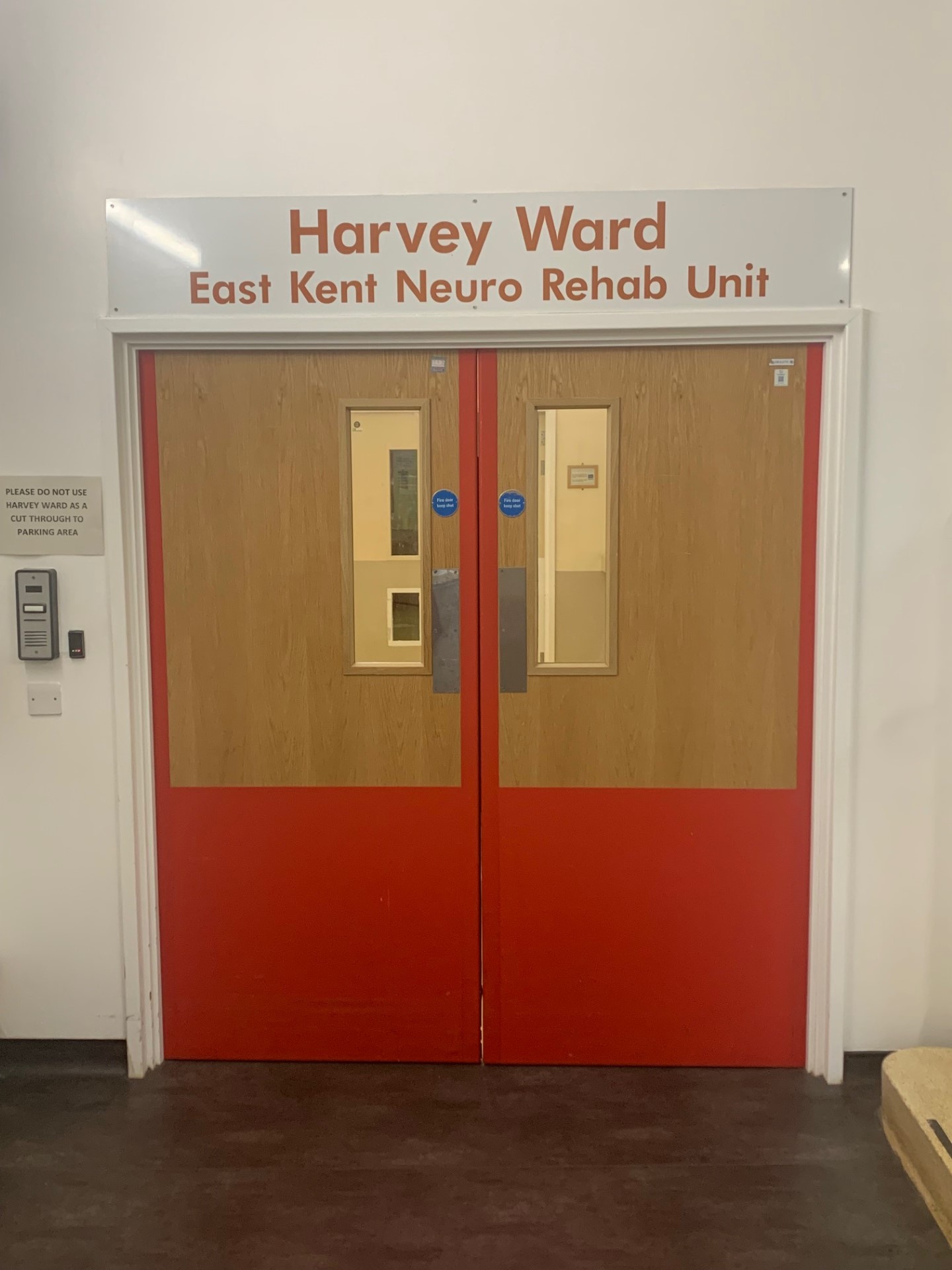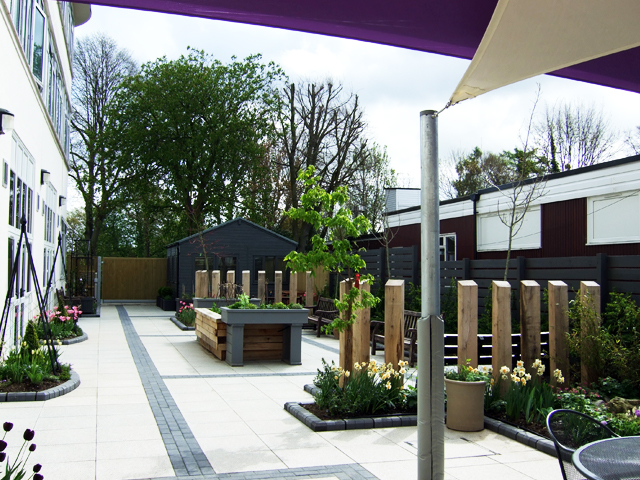East Kent Neuro Rehab Unit (EKNRU), Kent and Canterbury Hospital
Information for patients from Neurology
You have been accepted to the East Kent Neuro Rehab Unit, and are now on the waiting list for a bed. The following information will help to prepare you and your family for what will happen when you arrive on the unit, and hopefully answer some of the questions you may have.
What is the East Kent Neuro Rehab Unit?
The East Kent Neuro Rehab Unit is based at the Kent and Canterbury Hospital.
The unit has space for 19 patients.
There are four bays on the unit, each with four beds. There is a shower room and toilet, and three side rooms.
There is a communal day room, where patients can have their meals and take part in group sessions.
There is a lovely accessible garden, that patients and family can use.
-
 Entrance to EKNRU
Entrance to EKNRU -
 Garden at Kent and Canterbury Hospital
Garden at Kent and Canterbury Hospital
The therapy sessions are in a separate area called Tower Neuro Rehab, which includes a physiotherapy gym, occupational therapy treatment rooms, a kitchen, and speech and language and neuropsychology treatment rooms.
Frequently asked questions
How long will I need to stay on the unit?
This depends on what brain / spinal injury you have, and how bad it is. When you arrive on the unit you will be assessed by the team (this includes doctors, nurses, physiotherapists, occupational therapists, speech and language therapists, and neuropsychologists). This will help us to see what you can and cannot do, and plan your treatment plans / goals.
After your assessment we will have a better idea of how long you are likely to need the help of the unit and its staff, and we will discuss this with you and your family. Estimated discharge dates can change, and depend on a lot of things, so it is best not to get too fixated on a particular date. To give you an idea, most patients have active rehabilitation and stay on the unit for eight to 12 weeks.
How much will I recover?
Recovery is different for everyone, and it is impossible to say how much recovery in this early stage will be possible. Research shows that recovery continues for years after an injury. People tend not to get back to exactly where they were before, but we help them start their rehab journey, so they are well enough to carry on their rehab themselves at home. Sometimes injuries or neurological conditions are so severe that recovery can plateau (where you have little or no change following a period of progress) or in some cases get worse. In these cases, we work with people to help give as much stability as possible, and think ahead about ways to manage a patient’s future needs.
Can my family visit me?
Yes, we encourage it and have a visitor policy in place. Please ask our ward manager or one of the nurses about visitor times. We like to include family members in therapy sessions, so they learn about and can be involved in your care.
You may find that family visits can be quite draining in the early stages of your recovery. Make sure you tell your family how much you want them to visit and how long to stay for, so you can prevent yourself from becoming too burned out and then too exhausted to do your rehab the next day.
What will happen during my stay on the unit?
You will have a timetable of therapy sessions from Monday to Friday, based on your individual needs. These may include physiotherapy, occupational therapy, speech and language therapy, and neuropsychology. The therapy sessions may take place on the ward or in specific treatment rooms / physiotherapy gym.
How will my family stay updated during my stay?
Your key worker will contact your next of kin during the first week, to give them a point of contact and answer any immediate questions.
A family meeting will be booked for the end of the second week. At this meeting we will discuss your referral, our assessment findings, your treatment plans, goals, and your estimated discharge date.
Your next of kin will get a copy of the notes taken in this meeting during the third week.
Your family will be invited to join a therapy session during the first four weeks, to help them understand your difficulties better.
What type of things should I try and have with me in hospital?
It’s always good to have some comfortable lounge wear or pyjamas, that are easy to get on and off.
Your physiotherapist may also like your family to bring in some trainers or suitable footwear for walking.
In the quieter moments you will need things to keep you busy or connected with loved ones. A mobile or tablet with their chargers can be handy, along with books or magazines. Make sure you have some headphones so you can watch videos or listen to the radio, and any glasses or hearing aids.
Some people find an eye mask or comfortable earphones / earplugs help them sleep better at night, by tuning out background noise or light.
What happens when I leave the unit?
Planning for your discharge home is a joint and shared decision / process, that includes yourself, your team, and your family and friends.
The hospital team will make sure you have everything set up for a safe discharge. You may need support to be at home safely, which will be decided based on your abilities at that time.
On discharge you may be referred to your local community therapy team. This team will provide you with support (often in your own home) to meet any outstanding rehabilitation goals you may have. Unfortunately, some people’s care needs may be so high that they are not able to return home, at least in the short-term. Support around this time will be given, to start with from the ward team and the Rapid Transfer Team (RTS), who support discharge and care on discharge from hospital.
Neurological injuries and rehabilitation
Brain and spinal injuries
Our brains do all our thinking, reasoning, planning, store memories, control all of our physical actions (such as walking, talking, hearing, seeing, eating, sleeping, and breathing), and control all our feelings. Our brain is our control centre. It is connected to the spinal cord, which is a network of nerves that sends messages to and from the brain. It is by far the most complicated and sophisticated system in the world.
Brain injuries (such as knocks to the head, strokes, and tumours) or long-term neurological conditions (such as multiple sclerosis and epilepsy) can happen to anyone. Sometimes these types of neurological injuries can change the whole pattern of a person’s life, from changes to physical abilities, thinking skills, or emotional needs. Everyone who has had a brain injury has a different story to tell and no two stories are alike.
Injuries to the spinal cord can cause weakness or complete loss of muscle function, and loss of feeling in the body below the level of injury (including loss of bladder and bowel control). Spinal cord injuries can be caused by accidents or degenerative changes in vertebrae or some kind of infections.
Once you are medically stable, your road towards recovery or partial recovery starts.
Neuro rehab
We do not fully understand how the brain recovers its functioning. We know that brain tissue does not spring back into life. But we also know that brains do seem to recover in the first two years after injury. After that, their recovery tends to slow down but continues for years and years (unless the neurological condition is known to be ‘progressive’).
When your brain injury occurs, it is likely that parts of your brain that were not previously used for a particular task can be brought in to perform tasks previously performed by now damaged areas - new pathways and thinking routes are being opened up. It’s a bit like if a big pothole appeared on the M1, a diversion or new route would need to be set up and put in place, so cars can have a new way to travel. Recovery and rehabilitation is all about finding those new routes, and practising them as much as possible to get the traffic (or information) flowing again.
Research shows that the brain heals more in an ‘enriched’ environment, for example one that has some complexity and encourages you to interact with other people. That is why neuro rehab wards are different from hospital wards: they are a place where you have therapy sessions, can practise tasks, and where you will be encouraged to do as much for yourself as possible. Your rehabilitation does not just take place with therapists, you and your family also have a part to play in getting your brain back ‘online’.
What does rehab involve?
Rehab tends to involve the following processes:
Assessments to build up a good understanding of your current strengths and weaknesses (skills and deficits).
Planning realistic goals to work towards, to improve areas of weakness that have been identified.
Breaking goals down into achievable steps or skills.
Teaching, practising, repeating, learning and learning again those skills or small steps.
Providing stimulation to all your senses.
Finding barriers to motivation and encouraging participation in rehab activities.
Increasing awareness and insight, to improve your engagement in neuro rehab.
Providing aids, strategies, and techniques for managing impairments.
Supporting your family in their journey, feelings, and knowledge of brain injury.
Providing advice and support in helping set up the next stage of your recovery, either at home or with further supported care.
Who will be involved in my rehab?
The people who will help you in your journey include nursing staff, health care assistants (HCAs), doctors, occupational therapists, rehab assistants, speech and language therapists, physiotherapists, and clinical psychologists.
Useful resources to help you and your family